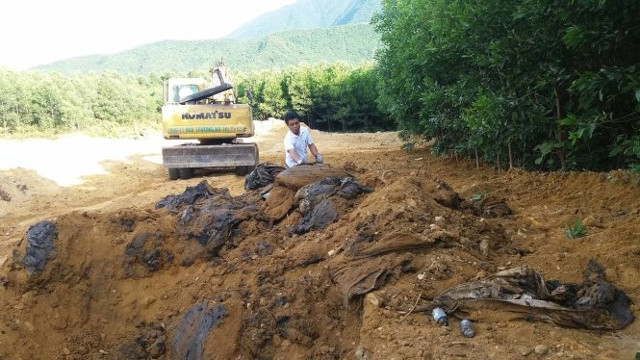Ownership and usage rights
(Baonghean.vn) - In recent days, public opinion has been stirred up by the fact that the director of a provincial environmental company signed a contract with a foreign company to bury industrial waste right on the land of his family's farm.
A foreign friend working in Vietnam wondered:
- If I were you, no matter how much money you give me, I would never bury that pile of toxic waste on my own land. Money cannot buy health. If he doesn’t think about himself, then at least he should think about his children and grandchildren, right? Does he not know the toxicity of industrial waste? If that’s true, then his fault is… too ignorant!
- Maybe he thought that farmland was not like residential land, so it wouldn't directly harm him. Besides, he could do whatever he wanted with his farm.
 |
| Authorities discovered 100 tons of Formosa waste buried at the farm of the Director of the Ky Anh District Environmental Company (Ha Tinh). Photo: Internet |
Hearing me say that casually, my friend expressed his disagreement and told me about the law in his country. The environment is so important that the trees in your garden, planted and cared for by you, will no longer be yours if they reach a certain threshold in terms of size, canopy coverage area, etc. Such “standard” trees will automatically be owned by the state. If you want to cut down a tree, move it, or do anything to change the current state of the tree, you will have to get permission from the government. There are even cases where people are fined tens of thousands of dollars just because they accidentally cut down a tree in their garden.
“That’s absurd,” I exclaimed. “Why don’t I have the right to do what I want with something that is clearly my property?” The other friend calmly replied: “Because the benefits and effects of those things are no longer just related to you, but have become a common problem for the whole community. Think about it: You may have the right to live on that land, but the tree you plant takes root and absorbs nutrients from deep within the ground to grow, its reach can completely extend far beyond the scope of your land. The canopy of the tree also occupies a part of the common space, the photosynthesis and respiration of the tree also contribute to creating the common biosphere. When you cut down the tree in your garden, it means you are changing the biosphere, space resources and land resources - things that belong to the nation and not to anyone.”
At this point, I suddenly looked back at the "classic" way of thinking of Vietnamese people about common and private ownership. The road in front of the house naturally becomes a personal space for people to use as they want, to use as they please. The pond and lake in front of the house naturally become a place to dump wastewater. The sidewalk in front of my house likes to burn trash, making the street full of smoke - who dares to say anything?... These are all ugly thoughts and actions of many Vietnamese people. In the end, it is only because we are still confused and mistaken between the right to use and the right to own. For things that belong to the community and the common interest, perhaps it is time to properly reconsider personal rights and responsibilities, instead of claiming them and then doing whatever they want...
Hai Trieu
| RELATED NEWS |
|---|
